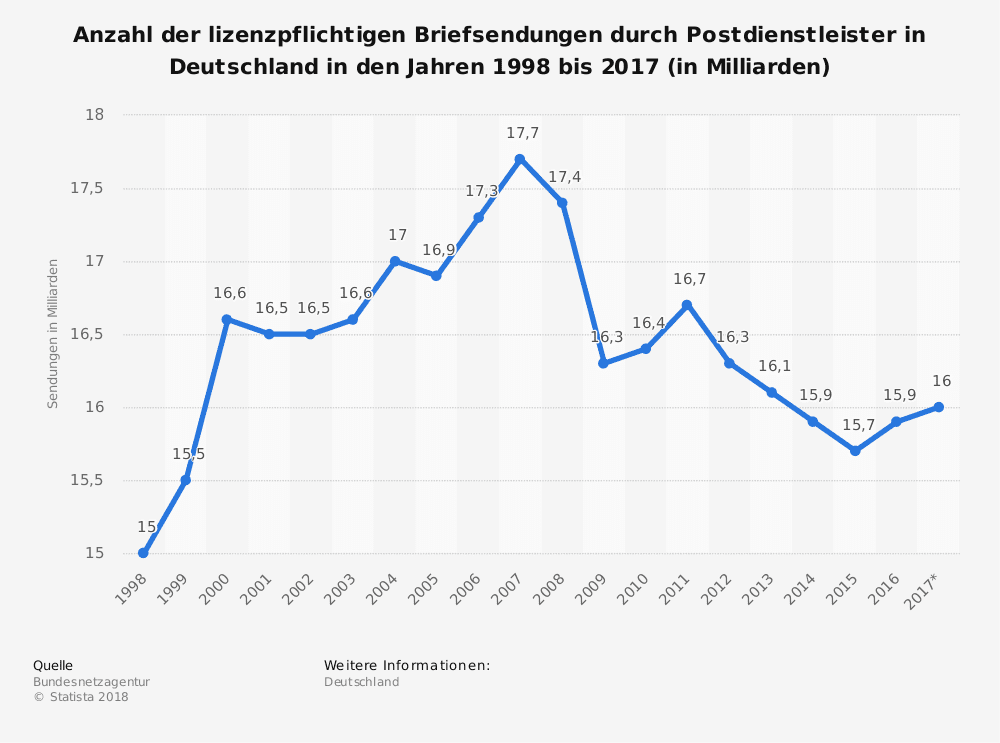What will the postal market look like in 10 years? How will postal operators work in 2030?
What will postal operators look like 10 years from now? Looking back, 10 years ago the first iPhone was released, smartphones had officially entered the marketplace. And looking back even 10 years further, I remember my first Nokia mobile phone and witnessing the liberalization of the postal market in Germany in 1998. When Spectos began, initially as a research and technology company for the postal industry, our biggest worry was about our line of business 15 years down the road. The thought at the time was that all letters would be digitized and transferred onto the internet.
Today, much has changed, but letters are still around and remain to be the main cash cow for most postal operators. Parcel volumes are skyrocketing all over the world, while mail volumes are declining – with the one exception of Germany.

Number of mail items subject to licensing by postal service providers in Germany from 1998 – 2017 (in billions)
This raises the question, why has the German market developed differently compared to other countries? Are German people more paper-savvy than others? Are we far more conservative in adapting new technologies? Perhaps!
On the other hand, could there be positive effects from a competitive postal market such as freedom of choice for the operator, value added services for business customers like monthly billing, pick up services for letters, digital return or track n trace for letters? Can decentralized and localized postal operators (as we have more than 100 significant players in Germany), react more flexibly on market requirements and technological change with better service quality? Or is it also the price, that hasn’t significantly increased for more than 10 years which stabilized letter mail?

Market shares of Deutsche Post Group and its competitors in the German mail market from 2008 to 2017
Whatever the reason, we can all agree that although the market has changed a lot, letter mail has remained and is still a profitable business case. This is certainly true now and will also continue to be so in 2030 – even when the market will look very differently again. I am convinced that paper based communication will grow into a premium service, since its awareness on the consumer side is far beyond its digital counterparts. Why?
Do you believe, there won’t be any books anymore in 2030? Have e-readers substituted hardcovers? Every time I think about this, I find it ironic, that one of the largest eCommerce and technology companies in the world has built up its business on books. However, it has worked – and Amazon didn’t actually substitute anything, but has revolutionized physical logistics with digital infrastructures. Even in this already fully digitized world, every week our mailbox is full with letters, leaflets and now small shipments too. Paper and physical still works! The young generation in Germany seems not to like the daily newspaper and magazines much anymore, but they obviously still like books as they did 10 years ago. Or to quote Yogi Berra: “The future ain’t what it used to be.”

Percentage of young people using daily newspapers (blue), books (black) Magazines (grey) from 2004 – 2017
So what can postal operators take away from that for 2030?
Certainties: Paper, in some way, will still be there and still needs to be delivered. The market will be more complex, value chains will keep splitting and diversifying. Service quality requirements for postal companies will diversify too. Paper remains a standard “premium” interface even within the digital world.
Probabilities: Rigid monopolies can’t respond to these changing requirements quick enough. Digital concepts will further increase the pressure on letter products, but people are still going to like paper based communication as a premium service. Networks, digital infrastructures and collaboration through standard digital and physical interfaces will be the core to success.
Anyways: A consumer driven end-to-end attitude is necessary, even if an operator just runs a specific part of the delivery chain. Keep the logistics mind at the core and support it by digital infrastructures to deliver better, faster, more convenient and secure.






